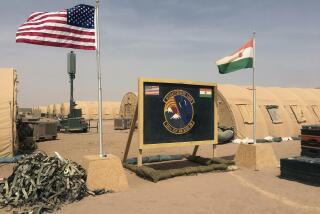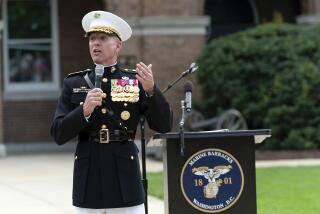A Changing of the Guard in Iraq
- Share via
RAMADI, Iraq — In a hopeful but cautious ceremony in Arabic and English, the U.S. Army on Saturday bequeathed to the Marine Corps responsibility for much of the volatile Sunni Triangle region north and west of Baghdad, where American troops come under attack daily.
Maj. Gen. James N. Mattis, commander of the Camp Pendleton-based 1st Marine Division, called it fitting that the Corps should inherit the task of bringing peace to a region of Iraq where the insurgents appear strong and the odds against a successful transition to democratic rule are daunting.
Insurgents have, often under the cover of night, used increasingly sophisticated tactics to intimidate the fledgling Iraqi police force and ambush U.S. military personnel. Last week, three Marines were killed in separate attacks as the 1st Marine Division moved to replace the Army’s 82nd Airborne Division.
Early this morning, the U.S. military said a rocket attack Saturday in Fallouja killed two U.S. soldiers and wounded six soldiers and one sailor.
The cities of Ramadi and nearby Fallouja have seen some of the worst violence.
“We see drawing Fallouja as the right place for us,” said Mattis, who led Marines into Afghanistan and also in the invasion of Iraq a year ago. “When it comes time to move the piano, the Marines don’t just move the piano bench. They move the piano.”
Such a move will require a two-pronged, seemingly contradictory approach by the Marines: a stepped-up campaign to capture or kill insurgents and an effort to convince Iraqis to cooperate with the Americans despite death threats from the insurgents.
Maj. Gen. Charles H. Swannack Jr., commander of the 82nd Airborne, paid tribute to Iraqi “patriots” who have sought to help the U.S. effort, some of whom have been killed as a result.
“We, too, have paid in blood,” he said, referring to the 65 Americans killed and more than 500 injured in the Sunni region since the war began last March.
Swannack said that despite the attacks, there were encouraging signs that the U.S. had made progress in the seven months since his division arrived.
“Seven months ago, they wouldn’t talk to us, and the children would pick up rocks and pretend to be throwing them at us,” he said. “Now, they’re consulting with us, talking with us, telling us” where insurgents have placed improvised explosive devices that are a major threat to U.S. forces.
Mattis said he wanted his troops to continue the dialogue with Iraqis begun by the Army. Several Iraqi leaders and tribal chiefs were given places of honor at the hand-over ceremony Saturday.
“I have come here to listen to you and respect your culture and work together,” Mattis told one sheik.
To prevent insurgents from disrupting the ceremony, extra patrols were ordered and security was tight. Even members of the 1st Marine Division band kept M-16s at the ready as they played the Iraqi national anthem and the official song of the 82nd Airborne.
The transition from Army to Marine Corps control -- which will be formalized this week as the 82nd Airborne Division heads home to Ft. Bragg, N.C. -- is part of the largest rotation of U.S. forces since World War II.
Mattis said that two-thirds of his troops took part in the invasion of Iraq. More than 25,000 Marines from Camp Pendleton and other bases are arrayed in several encampments in the Al Anbar province, including a sprawling compound in Ramadi that once was the home of Saddam Hussein’s late son, Uday.
Marines from Camp Pendleton were among the first U.S. troops to breach the Iraqi border last March and begin the push toward Baghdad. When Baghdad fell, Marines advanced north to Tikrit, Hussein’s hometown and the stronghold of his Baath Party.
The differing assignments given to Lt. Col. Keil Gentry, an 18-year veteran of the Marine Corps, during the invasion and the start of this year’s “security and stabilization” mission show how the role of the Marines has evolved.
Gentry was a logistics officer for an artillery battalion on the Kuwait-Iraq border that pounded Iraqi military positions as the invasion began. Now, he will help coordinate an effort involving assistance to schools and hospitals.
“We want to do less shooting of artillery and more handing out of medical supplies,” Gentry said.
More to Read
Sign up for Essential California
The most important California stories and recommendations in your inbox every morning.
You may occasionally receive promotional content from the Los Angeles Times.










